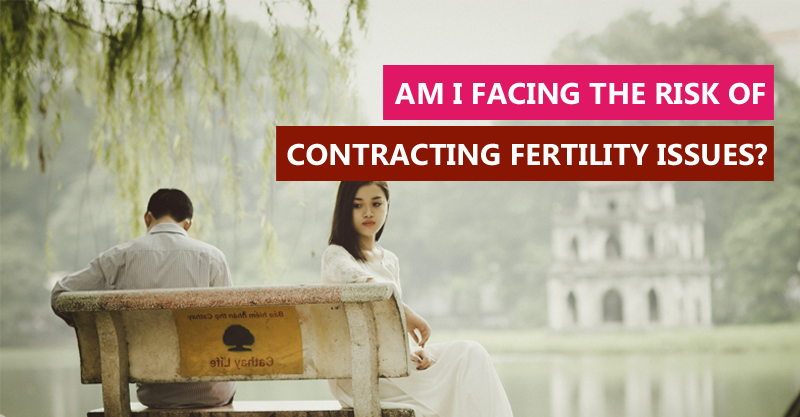Am I facing the risk of contracting Fertility issues?
Originally posted 2021-09-29 04:37:27.
There are many people suffering from fertility issues, come know about this problem only when trying to become a parent. The reason is because, there might not develop any symptom related to infertility issues. You may probably be planning to have children in the near future or actively trying now. If so, then it will be useful for you and your partner to seek crucial knowledge which can help to reduce the chances not getting pregnant.
Although there are many things affecting fertility that cannot be controlled, few things are very much within your purview.
Infertility risk factors
Fertility related risks are equally borne by both men and women. Doctors may not be in a position to identity the exact cause or both partners may suffer from infertility issues and this amounts to 1/3rd f al cases.
Few factors affecting the ability of the couple to have baby include:
Age: Specific number of eggs can be found in the woman naturally. But with age, this number tends to drop, thereby making it tough on her part to become pregnant once she enters her mid-30s. There is significant drop in her chances to get pregnant by 40, to 67% from 90%. By the time she enters 45 years of age, her chances become mere 15%. At the same time, on crossing age 40, the man also becomes less fertile.
Is it possible to reduce your risk? Somewhat! Once ready to bear children, avoid waiting. There are more chances when younger.
Smoking: You are likely to get less pregnant if you smoke marijuana or tobacco. Both can reduce sperm count among men and increase chances of miscarriage in women. When compared to non-smokers, smokers are found to hit menopause by about two years earlier. It is also cited to be the reason for occurring of ED (erectile dysfunction).
Is it possible to reduce your risk? Yes! Avoid all types of tobacco products and smoking.
Alcohol consumption: Present doctors strictly recommend not consuming alcohol even in those previously prescribed safe limits for women during pregnancy. There might develop risk of birth defects and also reduce chances of becoming pregnant. Heavy drinking by men can cause decrease in sperm count.
Is it possible to reduce your risk? Yes! When trying to conceive a baby, both men and women are to refrain from alcohol consumption.
Weight: Overweight women may experience irregular periods and also skin ovulation. Even extremely underweight women may develop problems with their reproductive system, which might stop functioning completely. Obese men are likely to develop low quality ED or sperm.
Is it possible to reduce your risk? Yes! It will be essential to discuss with the physician on getting knowledge on how to maintain safe weight, eat correctly and timely and exercise. This is crucial for those who have crossed 40. However, avoid overdoing it, which otherwise will only strain your body.
Mental health: Stress and depression if experienced may affect those hormones which regulate the reproductive cycle. Those dealing with such issues might not have normal ovulation and men may experience reduced sperm count.
Is it possible to reduce your risk? Yes! There can be stress in life. But it should be reduced as much as possible, especially when trying to conceive a baby.
STDs: There can be risk of contracting STDs if having unprotected sex. Women may face the risks of fallopian tube infections and pelvic inflammatory disease due to gonorrhea and Chlamydia. Men may face infertility issues due to epididymis blockage.
Is it possible to reduce your risk? Yes! Condom should be used every time when having sexual intercourse to eliminate the chances of contracting specific type of STDs.
Environmental factors: Some factors might be present in the day to day life, which might diminish the chances to get pregnant. This is more so if your work involves handling toxic hazards or substances. Some dangers may include heavy microwave or electromagnetic emissions, chemicals, high temperatures, pollution and pesticides. Some diseases like cancer require chemotherapy and radiation treatments which may affect eggs and sperms.
Treatment: Male Infertility Treatment, Female Infertility Treatment
Related Links :
- Ayurveda Infertility Treatment Clinic in Ongole
- Ayurveda Infertility Treatment Clinic in Raichur
- Ayurveda Infertility Treatment Clinic in Manjeshwaram
- Ayurveda Infertility Treatment Clinic in Al Ashkharah
- Ayurveda Infertility Treatment Clinic in Gurmatkal
- Ayurveda Infertility Treatment Clinic in Madikeri
- Ayurveda Infertility Treatment Clinic in Matadakurubarahatti
- Ayurveda Infertility Treatment Clinic in Sorab
- Ayurveda Infertility Treatment Clinic in Kothagudem
- Ayurveda Infertility Treatment Clinic in Basavana Bagevadi





